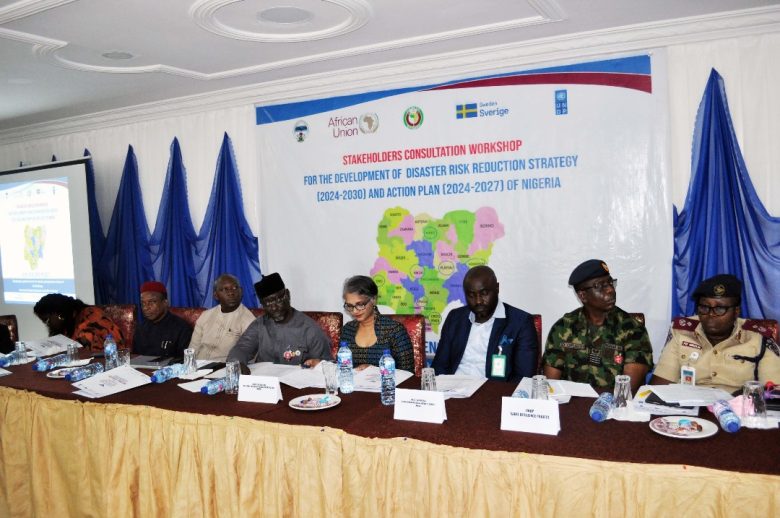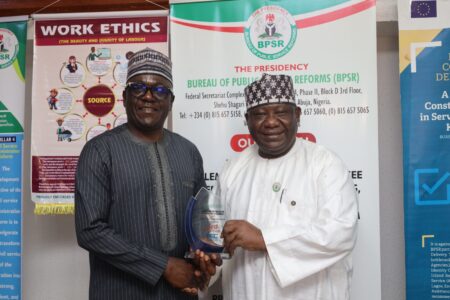The National Emergency Management Agency (NEMA) has commenced stakeholder consultation to develop the National Disaster Risk Reduction Strategic Action Plan to strengthen efforts towards building disaster resilience in Nigeria.
Director General NEMA Mustapha Habib Ahmed who disclosed this in Abuja at the launch of the stakeholders consultative workshop said the risk reduction action plan will also aid implementation of the Sendai Framework 2015-2030 in Nigeria.
He said the “need for the development of this Plan arises from the outcome of the assessment conducted by Overseas Development Institute on behalf of the United Nations Development Program on the Sahel Resilience Program. The assessment was aimed at ascertaining the status of Disaster Risk Reduction in the evaluation of the implementation of the Sendai Framework 2015-2030 in the seven West African Sahel countries of Nigeria, Burkina Faso, Chad, Mali, Mauritania, Niger, and Senegal.
“Findings in the assessment report, indicate that in furtherance to the plans and frameworks so far produced by the National Emergency Management Agency (NEMA), it is necessary to develop a comprehensive document for Disaster Risk Management for Nigeria.

“This plan is also very critical in enabling Nigeria to align with and drive the targets of the Sendai Framework and the African Program of Action on Disaster Risk Reduction. Furthermore, the recent escalation and growing frequency and severity of disasters in the form of banditry, boat mishaps, building collapse, and urban and market fires coupled with hydro-meteorological hazards powered by climate change and climate variability have ignited the compelling desire to develop Nigeria’s Disaster Risk Management Plan.”
In furtherance to the imperative for the plan, he said NEMA decided to partner with the United Nations Development Program (UNDP) through its Sahel Resilience Project; titled “Strengthening Capacities for Disaster Risk Reduction and Adaptation for Resilience in the Sahel Region: Fostering Risk-informed Solutions for Sustainable Development’’.
He acknowledged the multi-partnership context of Sahel Resilience Project implementation led by the UNDP in partnership with the African Union Commission (AUC), ECOWAS, UN Women, the Lake Chad Basin Commission, AGHRYMET and other regional organizations as he expressed the appreciation of the Government of the Federal Republic of Nigeria to these International Organizations and the Government of Sweden that sponsored the project.
“The project will no doubt strengthen the resilience of Nigeria and the entire Sahel Region of West Africa”, he noted.
Speaking further, he said “Today’s event becomes even more pertinent in consideration of the high level of vulnerability and fragility of the countries covered by the Sahel Resilience Project within Africa South of the Sahara. It is on record that the high level of vulnerability of these countries is driven by fragile economies, environmental degradation, extreme weather conditions, low levels of income, and insecurity posed by terrorism and political volatility. No doubt working together with multiple development actors under the Sahel Resilience Project will help the countries of the region to collectively improve their resilience in consideration of the trans-boundary nature of disaster events. For us in Nigeria, the Sahel Resilience Project is expected to support the renewed hope agenda of the Federal Government, especially in the areas of poverty eradication, food security, and inclusivity.”
The DG NEMA also spoke about the ongoing evaluation of the 2023 flood season by NEMA and efforts to address recurring boat mishap, building collapse, and urban and market fires which have become dominant in Nigeria’s disaster risk profile.
He emphasized that the management of disaster risks in contemporary times must be anchored on Preparedness, Mitigation, Risk Reduction, and Adaptation. He added that “this can only be realized with the full deployment of a strategic action plan that assigns roles and responsibilities to implement Federal Government MDAs and other relevant stakeholders.”
He then, urged the stakeholders to give their best as “we have been working together over the years, let us sustain the momentum to develop a comprehensive document for disaster risk management in Nigeria, that will go beyond 2030, the Sendai Framework regime.
In her remarks, the UNDP Sahel Resilience Project manager for Nigeria Dr Reshmi Theckethil said the UNDP is working with NEMA to develop the disaster risk reduction strategy document that aligns with the African Union Programme of Action and regional efforts to strengthen disaster preparedness and response capabilities in West Africa and the Sahel region.
The Director General Nigerian Hydrological Service Agency Engr Clement Onyeaso Eze who was also at the opening of the workshop commended NEMA for living up to its coordination roles of disaster management in Nigeria.
Participants at the workshop were drawn from various stakeholder organizations including NASRDA, the Nigerian military, FRSC, FCT Emergency Management Agency, UN System, NIHSA, National Bureau of Statistics, National Orientation Agency, NIMET, and other MDAs.









